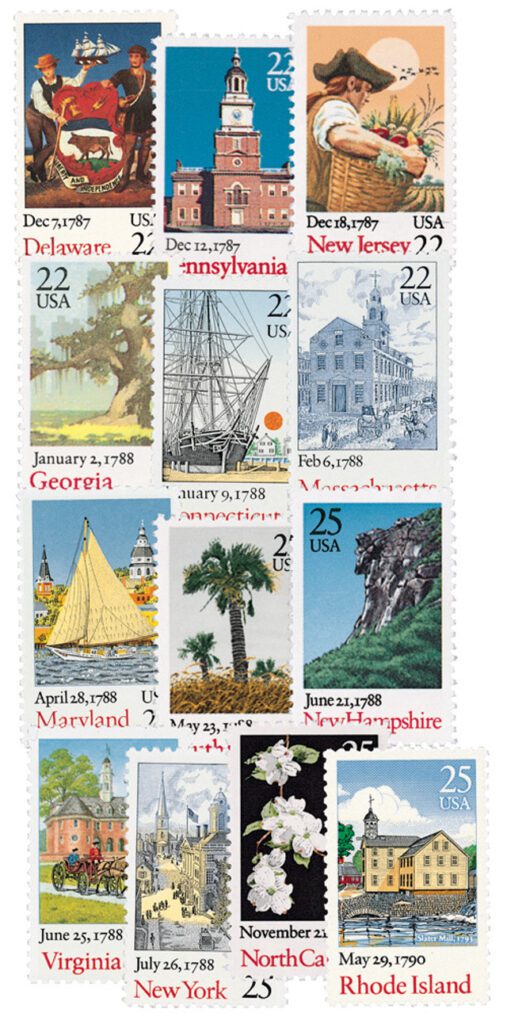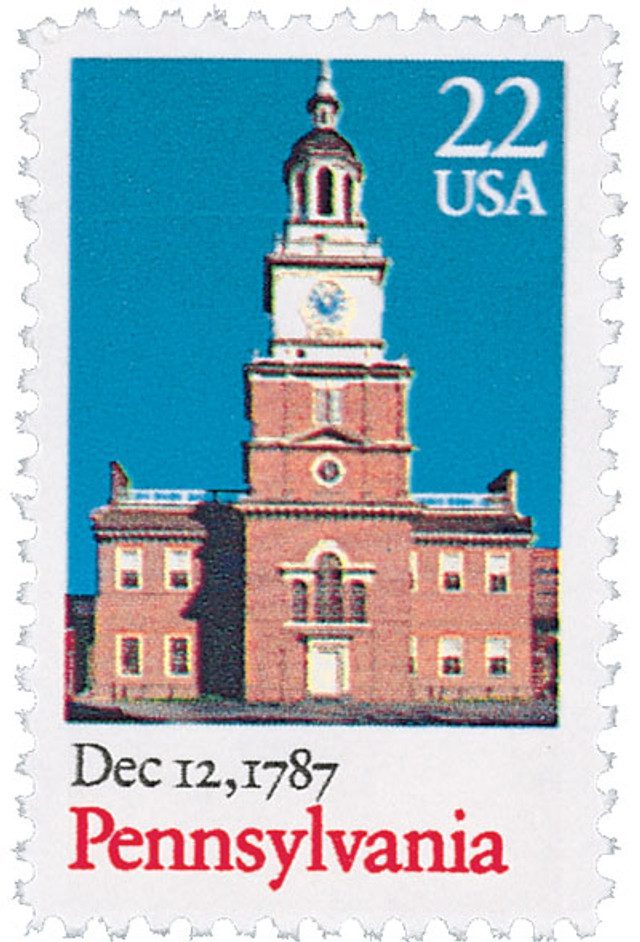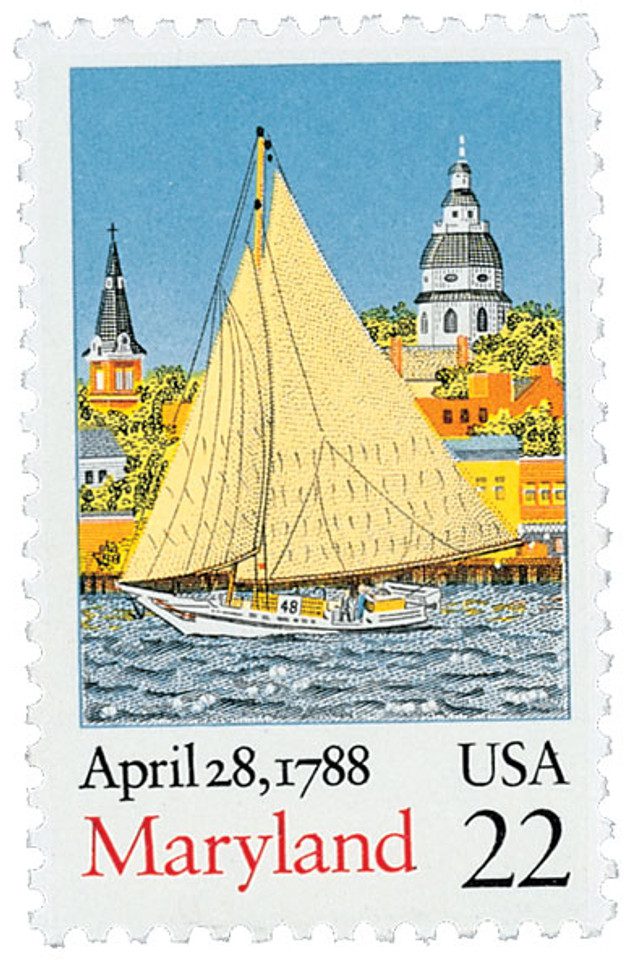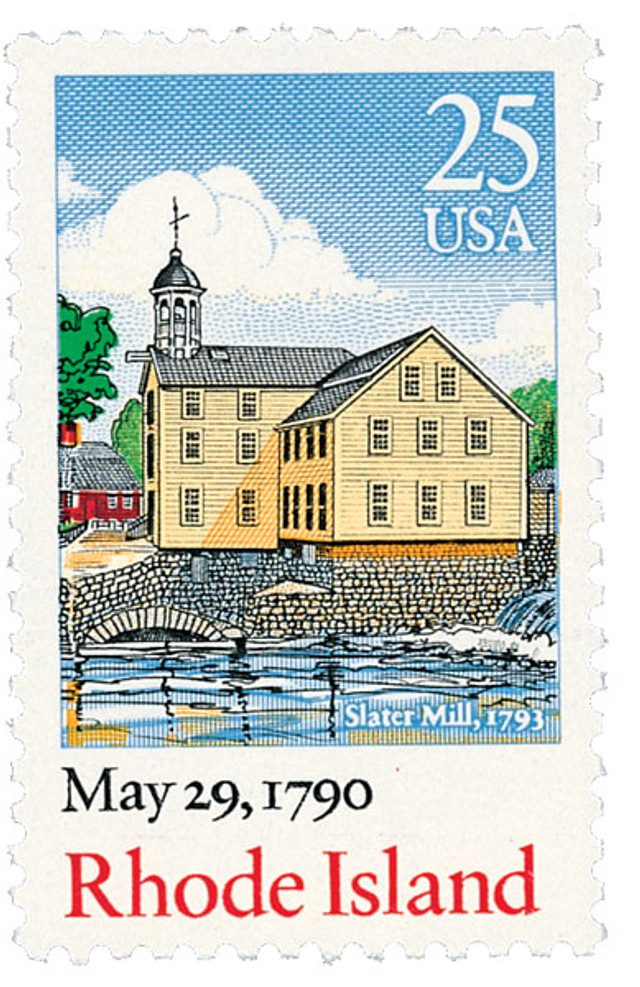On July 4, 1987, the USPS issued the first in a series of stamps honoring America’s first 13 states. The series honored each state’s 200th anniversary of statehood as well as the bicentennial of the ratification of the Constitution. The first stamp in the series, honoring Delaware, was issued on July 4, 1987. Prior to this issue, Delaware hadn’t been honored on very many stamps. It was included in the State Flags and State Birds and Flowers se-tenants, and the 1938 stamp honoring the 300th anniversary of the landing of the Swedes and Finns near Wilmington. The Delaware stamp’s design pays tribute to the state’s history of farming, shipbuilding, and coastal commerce. It also pictures a Revolutionary-era militiaman, ready to defend American ideals. The stamp was issued at Dover’s Legislative Hall.
All of the stamps in the series were issued in the order the states ratified the Constitution, though not always on the exact date of ratification. The second stamp in the series, honoring Pennsylvania, was issued on August 26, 1987, in the state capitol of Harrisburg. The stamp pictures Philadelphia’s Independence Hall, which was formerly the State House of Pennsylvania. The stamp’s designer used a modern photo of the building, so it pictures a tower on top of the hall that wasn’t there in 1787. The third stamp in the series honored New Jersey and was issued on September 11, 1987, at the State Museum Auditorium in Trenton. Like Delaware before it, New Jersey had few stamps honoring its history before this series. The New Jersey stamp pictures a painting of a colonial farmer carrying a basket of fresh produce. The stamp’s designer posed for a photo to provide the model for the stamp.
The fourth stamp in the series, honoring Georgia, was issued on January 6, 1988, in Atlanta. A number of subjects were considered for the vignette of the Georgia stamp, including agricultural scenes, Georgia’s “Golden Isles,” a Greek revival column, and a southern belle. In the end, a watercolor of a live oak, Georgia’s state tree, was selected. The tree is shown with Spanish moss hanging from its branches with a modern Atlanta skyline in the background. After the stamp was issued, it was pointed out that live oaks are usually found along the coastal plains, far away from Atlanta. The Connecticut stamp was the first in the series to be issued on the exact statehood anniversary – January 9, 1988. It was issued at the Old State House in Hartford. Some of the topics considered for the stamp included the Charter Oak, the state capitol, and the state bird. The final design pictures the whaling ship Charles W. Morgan in the village of Mystic. Behind this are some identifiable buildings – Schaefer Tavern and the Mystic Bank.
The sixth stamp in the series, honoring Massachusetts, was issued on its bicentennial, February 6, 1988, in the Boston State House. The State House, Massachusetts’s first public building and the place where the ratifying convention first met, was also the subject of the stamp vignette. The image was taken from a 1793 engraving entitled A Southwest View of the State House, in Boston. This stamp was the only one in the series to be printed by intaglio only. The seventh stamp in the series, honoring Maryland, was issued on February 15, 1988, two months before its anniversary, at St. John’s College in Annapolis. The stamp pictures skipjack sailboat Clarence Crockett in the Severn River at Annapolis. Also visible are the dome of the Maryland State House and St. Anne’s Church.
The eighth stamp in the series, honoring South Carolina, was issued on its anniversary, May 23, 1988, at the State House in Columbia. It was the first commemorative to have the new 25¢ first-class rate. This stamp’s design featured three palmettos, the state tree, with sea oats waving in the foreground. The ninth stamp in the series, honoring New Hampshire, was issued on its anniversary, June 21, 1988, at the State House in Concord. New Hampshire was the ninth state to ratify the Constitution, which the document’s framers had defined as the number needed for the document to go into effect. Because of this, New Hampshire is sometimes called “the state that made us a nation.” The stamp’s design featured a familiar subject, the Great Stone Face (also known as the Old Man of the Mountain), which had been pictured on a previous stamp in 1955.
Four days later, the Virginia stamp was issued on its anniversary, June 25, 1988, at the Capitol building in Williamsburg. The stamp also pictures the Capitol in Williamsburg with a horse and carriage. The building pictured on the stamp was a 1934 reconstruction of the original building constructed in 1701. The 11th stamp in the series, honoring New York, was issued on its anniversary, July 26, 1988, at the State Museum in Albany. The actual ratification 200 years earlier had taken place in Poughkeepsie, while the stamp’s design pictured a scene in New York City. The USPS had worked with four different artists for months attempting to settle on the design for this stamp. They ultimately settled on an engraving from an unknown source picturing Federal Hall and Trinity Episcopal Church. Some complained that the church as its shown wasn’t completed at the time of ratification, but the USPS said the image was “reminiscent of the era.”
It was more than a year before the next stamp in the series was issued honoring North Carolina. That stamp was issued on August 22, 1989, at the First Presbyterian Church in Fayetteville. It was issued a few months before its anniversary in November as the USPS prefers to not issue new non-holiday stamps that time of year. The stamp pictured the dogwood, the state flower, which had previously appeared on the State Birds and Flowers issue. On the state’s actual statehood anniversary of November 21, every city in the state also had a special bicentennial pictorial cancellation. The final stamp in the series, honoring Rhode Island, was issued on its statehood anniversary, May 29, 1990, at the Slater Mill Historic Site in Pawtucket. The USPS originally considered a number of maritime designs for this stamp, and nearly settled on one picturing an anchor on a dock, but the postmaster general rejected it. They had previously received a number of requests to issue a stamp for Slater Mill, a historic textile mill in Pawtucket, and decided to make that the focus of the Rhode Island stamp. After the concerns of the New York stamp, they opted to add “Slater Mill, 1793” to this stamp’s design to make it clear that the image wasn’t supposed to be from the statehood date. That made the Rhode Island stamp the only one in the series to have this additional information included.

FREE printable This Day in History album pages |
Discover what else happened on This Day in History.














Loved seeing this. Thanks Mystic Stamps.
Happy Independence Day Mystic stamp company loved reading this article on how each state got its official stamp and what a lovely set of stamps they are hope to get my hands on some to had to my stamp collection HAPPY INDEPENDENCE DAY AMERICA
Good informative story on our national holiday…Thanks for taking the time and effort to put this all together. Please keep up the good work, we all really enjoy these daily history lessons!
These stamps are just beautiful. Thanks Mystic for keeping this history alive.